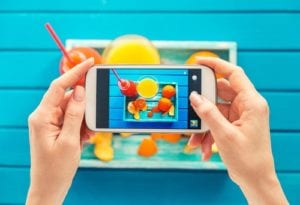In 2015, a study published in Brain and Cognition examined the reaction of the brain to images of food on social media platforms like Instagram. 63% of the news feeds scrolled through by devoted users of social media are filled with images of food. Today’s food snapshots aren’t just a quick pic of what you’re eating. There’s an entire culture behind photographing food that makes magazines look like amateurs. People go out of their way to bring their sweet and savory creations or dining options to life, evoking envy- and apparently a significant amount of brain activity, in everyone who merely gets to look.
According to Fox, “the brain undergoes dramatic neurophysiological changes in response to food images that exacerbate physiological hunger.” In layman’s terms, when you’ve just eaten and are scrolling through your social media news feed as you digest, seeing pictures of taste-bud tantalizing food can cause you to feel hungry. For some people, this can be problematic.
Those with a tendency toward weight issues, like those who might be clinically obese, were more responsive to pictures of food after eating than those at a healthy weight. Your physical health, specifically your weight, might be directly correlated by how severely you react to pictures of food, despite having food in your stomach.
Images alone are not the only problem. For many years researchers have investigated the growing amount of hours spent on social media which can lead to many physical health problems. First of all, technology addiction can lead to a decreased amount of exercise and poor eating choices. Second of all, overuse of social media has been linked to poor body image and the development of eating disorders.
Getting Away From Social Media Munchies
Have you found yourself raiding the pantry after scrolling through social media? Here are some tips for maintaining a balanced recovery lifestyle when it comes to social media
- Limit your social media use to one or two times a day
- Avoid using social media immediately after a meal
- Wait until the next day to post your own pictures of food
- Instead of laying down or sitting around after a meal, try going for a short walk. It will help with digestion as well as focus your mind somewhere other than social media
- Work with a trained dietician and nutritionist to discover the right meal plan for your body
Food is a way to create healing in recovery. It can also create more pain. At Avalon By The Sea, we utilize a gourmet chef and trained nutritionists to work with each client’s needs to provide a healthy and balanced lifestyle. For information on our treatment programs or to receive a confidential assessment, call us today at 1 888-958-7511.










